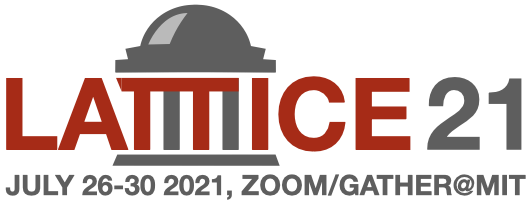Speaker
Description
Panelist Biographies:
Professor Aida El-Khadra received her PhD. in 1989 from the University of California, Los Angeles, after receiving her diploma from Freie Universitaet, Berlin, Germany. She held postdoctoral research appointments at Brookhaven National Laboratory, Fermi National Accelerator Laboratory, and the Ohio State Univerity before joining the Illinois faculty in 1995. El-Khadra is a fellow of the American Physical Society, a recipient of the Department of Energy's Outstanding Junior Investigator Award, and a Sloan Foundation fellow. In addition to a number of other research and teaching awards, she has also been named a Fermilab Distinguished Scholar.
Vera Gülpers is a lecturer at the University in Edinburgh (UK) since July 2020. Vera finished her Ph.D. in September 2015 at the University in Mainz (Germany), where she had already graduated with a Diploma in Physics in 2011. Following her Ph.D., Vera has been a Postdoctoral Researcher at the University of Southampton (UK) from 2015 - 2018 and subsequently at the University of Edinburgh from 2018 - 2020 before taking on the Lecturer position in Edinburgh.
Taku Izubuchi received his Ph.D. at Tokyo University and held a postdoctoral position at Tsukuba University. In 1999 he was appointed as an Assistant Professor at Kanazawa University, and since 2003 he is affiliated with Brookhaven National Laboratory (BNL), as an RBRC Fellow of RIKEN, and later as an Assistant Scientist and RIKEN fellow of RIKEN-BNL Research Center. In 2010 he became an Associate Scientist at BNL, and since 2011 is the group leader of the Computing Group of RIKEN BNL Research Center. He is a recipient of the 2012 Ken Wilson Lattice Award, 2018 APS fellowship, 2019 BNL Science and Technology Award.
Xiangdong Ji received his bachelor's degree from Tongji University in 1982 and his Ph.D. from Drexel University in 1987. He was a postdoctoral researcher at Caltech and MIT. In 1991, he became Assistant Professor at the MIT, and in 1996 he moved to the University of Maryland, where he was the chair of the Maryland Center for Fundamental Physics from 2007 to 2009. He is also professor and chair of the Institute for Nuclear and Particle Physics at Shanghai Jiao Tong University. Since 2005, he has also been a visiting professor at Peking University. In 2014 he won the Humboldt Prize and in 2015 he won the Outstanding Nuclear Physicists Award from the Jefferson Sciences Associates. In 2000, he became a fellow of the American Physical Society. In 2003, he won the Oversea Outstanding Chinese Scientist Award. In 2016 he won the Herman Feshbach Prize in Theoretical Nuclear Physics for pioneering work in developing tools to characterize the structure of the nucleon within QCD and for showing how its properties can be probed through experiments; this work not only illuminates the nucleon theoretically but also acts as a driver of experimental programs worldwide. In addition to his focus on nuclear physics, he also works on dark matter physics using liquid xenon detectors (a variety of neutrinos being candidates for dark matter), leptogenesis, neutrino mass, and neutrino oscillation in GUT models.
Jian Liang got his Ph.D. in 2015 from the Institute of High Energy Physics, Chinese Academy of Sciences. Then, he moved to the University of Kentucky as a postdoctoral fellow in the group of Prof. Keh-Fei Liu for 5 years. Since 2020, he is holding a faculty position at the Institute of Quantum Matter in South China Normal University.
Marina Marinkovic, currently an assistant professor at ETH Zurich, earned her Ph.D. in the computational physics group at the Humboldt University of Berlin. After a postdoctoral stay at the University of Southampton, she was awarded a prestigious CERN fellowship, which was followed by a Hitachi Assistant Professorship in High-Performance Computing, and a junior professorship at the Ludwig Maximilian University of Munich. As one of the founding members of RC* collaboration, Marinkovic investigates the inclusion of isospin breaking effects to lattice simulations, while as a member of MUonE collaboration she uses lattice insights to augment results of CERN experiments. Her research on scalable algorithms for strong interaction aims to bring machine learning to the established areas of particle physics in simultaneous preparations for exascale computing and quantum computing era.
Tilo Wettig studied physics at the University of Tübingen and at SUNY Stony Brook, where he got his Ph.D. in 1994. After two postdocs at the Max Planck Institute in Heidelberg and at the Technical University of Munich he moved to Yale University as an assistant professor (1999) and associate professor (2003). In that period he was also a fellow of the RIKEN-BNL Research Center. In 2004 he moved to the University of Regensburg, where he is a full professor.
Savvas Zafeiropoulos is a researcher in the particle physics section of the Centre for Theoretical Physics - CNRS at the Aix-Marseille-Université et Université de Toulon. His research interests include Lattice Quantum Chromodynamics, Random Matrix Theory, Chiral Perturbation Theory, Non-Perturbative Renormalization, Phase Diagram of QCD, Quark-Gluon Plasma, Heavy Ions, Graphene, Parton Distribution Functions.
